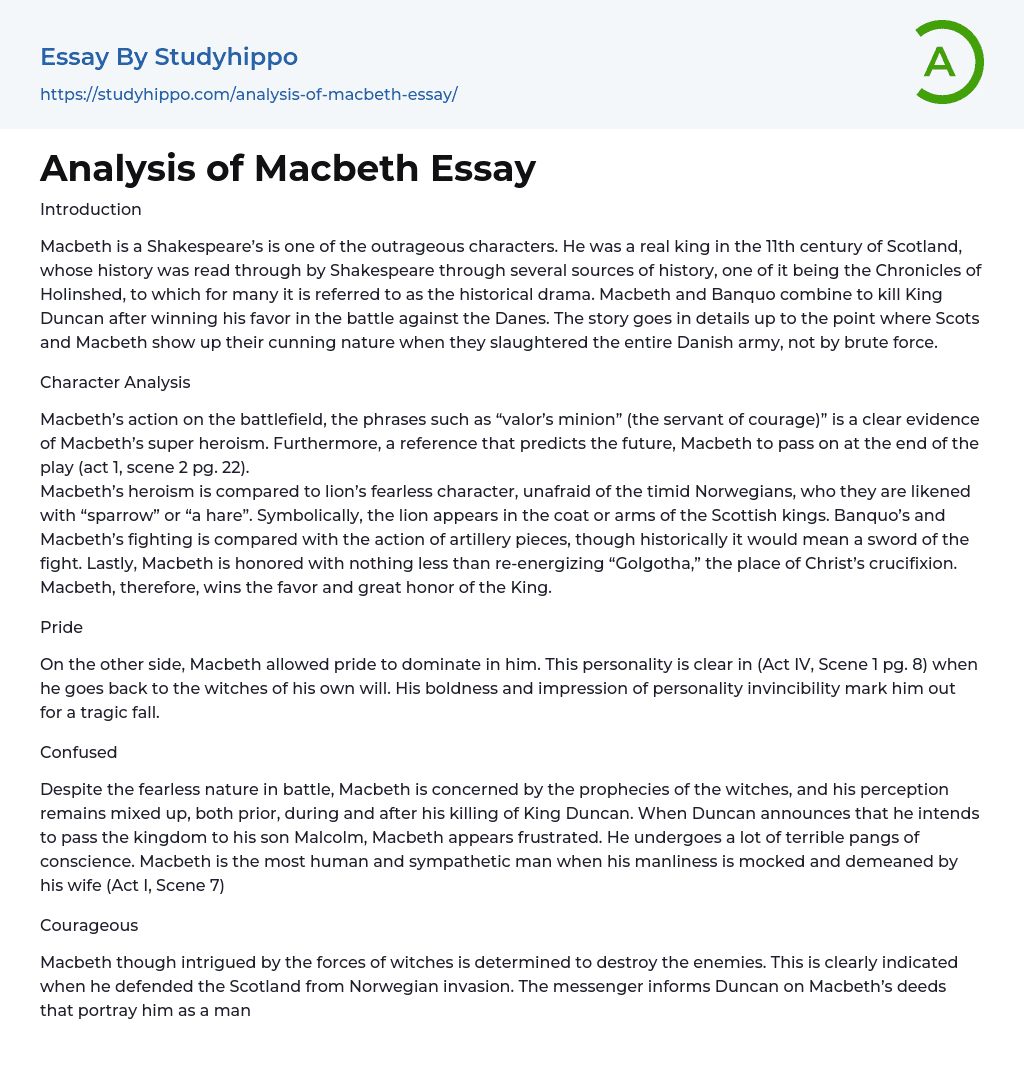Introduction
Macbeth is a Shakespeare’s is one of the outrageous characters. He was a real king in the 11th century of Scotland, whose history was read through by Shakespeare through several sources of history, one of it being the Chronicles of Holinshed, to which for many it is referred to as the historical drama. Macbeth and Banquo combine to kill King Duncan after winning his favor in the battle against the Danes. The story goes in details up to the point where Scots and Macbeth show up their cunning nature when they slaughtered the entire Danish army, not by brute force.
Character Analysis
Macbeth’s action on the battlefield, the phrases such as “valor’s minion” (the servant of courage)” is a clear evidence of Macbeth’s super heroism. Furthermore, a reference that predicts the future, Macbeth to pass on at the end of the play
...(act 1, scene 2 pg. 22).
Macbeth’s heroism is compared to lion’s fearless character, unafraid of the timid Norwegians, who they are likened with “sparrow” or “a hare”. Symbolically, the lion appears in the coat or arms of the Scottish kings. Banquo’s and Macbeth’s fighting is compared with the action of artillery pieces, though historically it would mean a sword of the fight. Lastly, Macbeth is honored with nothing less than re-energizing “Golgotha,” the place of Christ’s crucifixion. Macbeth, therefore, wins the favor and great honor of the King.
Pride
On the other side, Macbeth allowed pride to dominate in him. This personality is clear in (Act IV, Scene 1 pg. 8) when he goes back to the witches of his own will. His boldness and impression of personality invincibility mark him out for a tragic fall.
Confused
Despite th
fearless nature in battle, Macbeth is concerned by the prophecies of the witches, and his perception remains mixed up, both prior, during and after his killing of King Duncan. When Duncan announces that he intends to pass the kingdom to his son Malcolm, Macbeth appears frustrated. He undergoes a lot of terrible pangs of conscience. Macbeth is the most human and sympathetic man when his manliness is mocked and demeaned by his wife (Act I, Scene 7)
Courageous
Macbeth though intrigued by the forces of witches is determined to destroy the enemies. This is clearly indicated when he defended the Scotland from Norwegian invasion. The messenger informs Duncan on Macbeth’s deeds that portray him as a man who had a lot of courage, who showed no traces of fear in wars. Duncan tells Macbeth of his reward for his great deeds. However, he is conflicting, the opinion of people as ambitious man through his soliloquies. (Act 1, scene 7 pg. 33)
Corrupt and Evil
The fact that Macbeth killed Duncan showed that he is evil. His decision and action to commit a premeditated suicide and cold-blooded murder alters and worsens the elements of his life. He is frequently haunted because of his terrible deed by his screaming conscience. Macbeth wonders whether the act of murder itself must, by necessity, carry consequences in the life to come or the judgment awaits him in this life. (Act 1, scene 7 pg. 11)
Greed for Power
The brave Scottish general, when he received prophesy that he will one day be the king of Scotland. Consumed by ambitions and spurred to action by his wife. This leads to king Duncan’s murder and took the Scottish
throne for himself. He is then haunted by guilt and paranoia.
Self-Centered
Macbeth becomes brutal and stamps out any perceived threat to his power. He believed himself to be beyond redemption. So he decides to hire two murderers to take down Banquo and his son Fleance, with a third murderer sent later sent to help. This was specifically meant to destroy any potential successor of the kingdom. The appearance of Banquo’s ghost in particular, causes him to swing to another state of mind until he is confused. (Act 1, scene 3 pg. 142)
Work Cited
- Shakespeare, William. The Riverside Shakespeare. Vol. 2. Houghton Mifflin, 1974.




